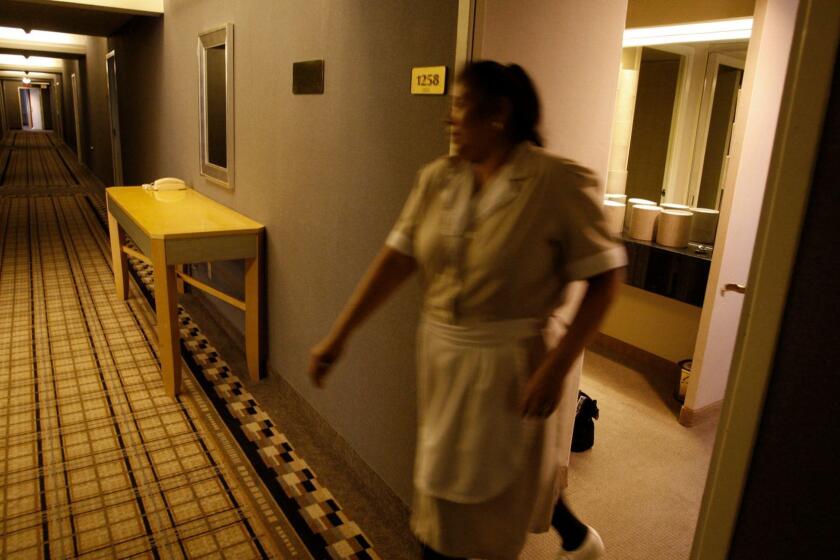Rancho Palos Verdes voters spurn effort to equip resort workers with panic buttons

- Share via
Voters in Rancho Palos Verdes soundly defeated a ballot initiative that would have raised resort workers’ salaries and equipped employees with panic buttons to help prevent sexual assaults.
The ballot measure, supported by a hotel workers union and opposed by the owner of the ritzy Terranea Resort, lost Tuesday. The vote was 1,712 in support of the initiative and 6,113 opposed. The union that collected signatures to put the measure on the ballot was heavily outspent in the campaign by the resort’s owner, Long Point Development.
The defeat was a blow to the hotel workers union, Unite Here, which wants to organize the Terranea staff. The union had similar ballot measures approved by voters over the last three years in Long Beach, Seattle and Oakland.
Unite Here attributed the loss to the more than $1 million spent by Long Point Development to pay for what the union called in a statement “misleading and negative mailers and ads.”
“The Terranea Resort bought this election,” said Kurt Petersen, co-president of Unite Here Local 11. “A boycott of the Terranea is the only ethical response to Terranea’s cynical campaign to deny legal protections against the risk of sexual assault in the industry.”
The Seattle measure was struck down in court, but most of the provisions of the ballot measure were later adopted by the Seattle City Council. Other cities, including Miami and Chicago, have adopted laws requiring panic buttons without a petition drive.
Under pressure from hotel unions, about 5,000 hotels add security measures to protect workers from sexual harassment. Unions say it is not enough.
The initiative would have required Terranea and the nearby Trump National Golf Club to provide panic buttons for employees who work alone in isolated locations and might be vulnerable to sexual assaults and threats. The union said it targeted Terranea because Sandra Pezqueda, a former contract worker, said she was fired in 2016 after complaining about the sexual advances of her supervisor.
The union has called for hand-held electronic devices that workers can use to summon security officers.
In response to pressure raised by hotel workers unions nationwide, some of the country’s biggest hotel companies vowed last year to provide their workers with security devices.
In a statement, the coalition of hotels said hotel company and property owners would be allowed to determine the most effective security device “with a range of options including devices with loud noise emitting features or emergency GPS tracking at the push of a handheld button.”
Terranea had said throughout the campaign that it already provided such technology for employees to automatically call for aid.
In a statement, Terranea President Terri A. Haack said the ballot measure was part of a two-year effort by Unite Here to unionize her workers without giving them a fair vote on the matter.
“The successful defeat of this measure is recognition that residents of Rancho Palos Verdes have seen through and repudiated Unite Here’s misinformation campaign and understand the union’s true agenda was to pressure Terranea to forfeit its employees’ right to vote if they want to unionize,” she said.
The measure also would have guaranteed workers a $15-an-hour minimum wage, with regular raises until 2022, among other benefits.
An economic analysis, commissioned by the city, said the initiative would have cost Terranea as much as $8 million a year by 2022. The analysis by the economic consulting firm Kosmont Co. said it was unable to collect financial information from Trump National Golf Club.
The measure was the topic of a community forum last month, hosted by the League of Women Voters of Palos Verdes Peninsula.
Nancy Mahr, vice president of voter services for the group, said the event drew a standing-room-only crowd to a community center. The group had been expecting no more than 80 people. Supporters and opponents of the measure were evenly split at the event but she said opponents of the measure dominated when it came to distributing campaign literature.
“Oh my God, we got a lot of mailers,” she said. “Some from both sides but predominantly from the con side.”
Campaign finance statements filed since Jan. 1 show that Long Point Development, the owner of the 102-acre shoreline hotel, contributed more than $1 million to a committee opposed to Measure B, plus $190,000 to support four City Council candidates who opposed the measure. Three of those candidates, David Bradley, Barbara Ferraro and Ken Dyda, were elected to the council.
Unite Here Local 11 had contributed $145,000 in support of the measure.
More to Read
Inside the business of entertainment
The Wide Shot brings you news, analysis and insights on everything from streaming wars to production — and what it all means for the future.
You may occasionally receive promotional content from the Los Angeles Times.












